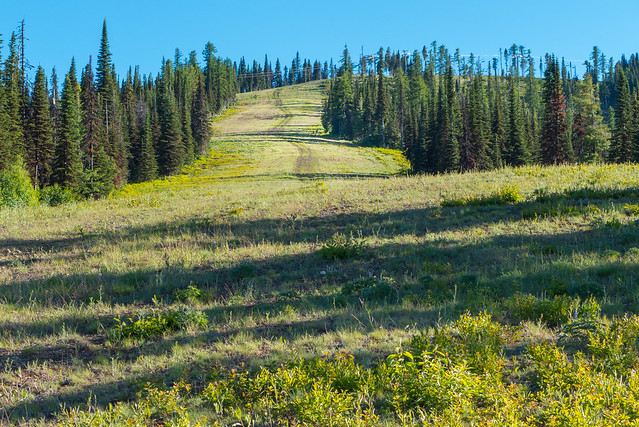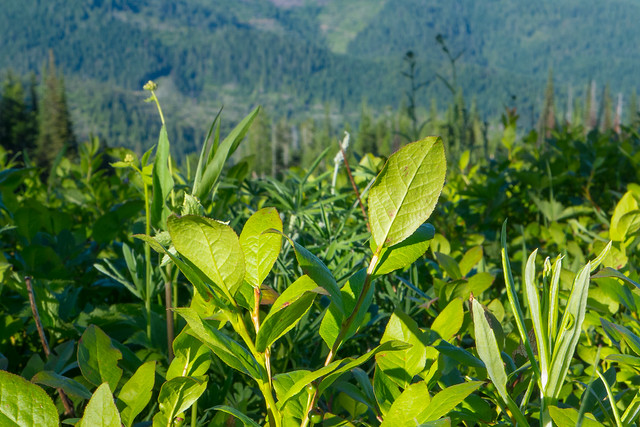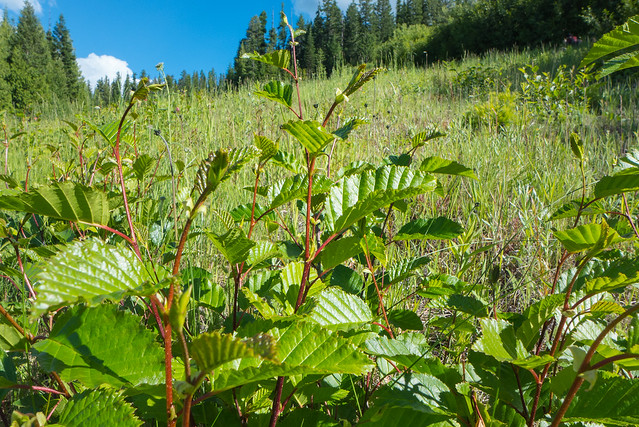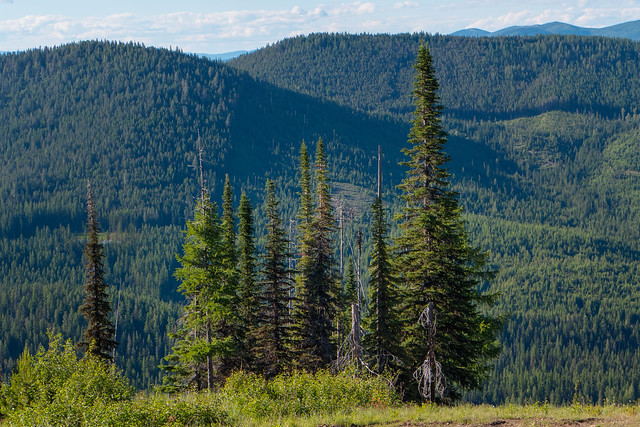The nations wax, the nations wane away;
In a brief space the generations pass,
And like to runners hand the lamp of life
One unto other.

Two of my children are hiking up my favorite ski run to the top of a 5773-foot mountain in Washington’s beautiful Colville National Forest. I joined them for the first part of the climb, starting at 3900 feet, but after bushwacking through thick shrubbery because one of us (not me!) decided to be adventurous, I’m happy to wait for them at the midway point.
There are people who will never sit on a mountain meadow in the long shadows of nearby trees, surrounded by a vast open vault of cool clean air filled with silence. What good fortune for me to be doing so on this beautiful day! It is a simple act of pure exuberant living, to climb even partway up this big hill on a Summer afternoon.
I sit on the soft ground, cushioned by some of the leafy little plants whose modest growth the maintenance crews allow here. In seven months, people will be skiing over this very spot. I have done so myself, probably more than a hundred times. Here is the place where I carve a long, joyous, final turn onto the catwalk, heading toward the lift after the thrill of a fast run pretty much straight down this wide smooth terrain.
Hopefully there are many more such runs in my winters ahead. (Better those than the other kind!) But I’ll probably never again have a season with 26 days on the slopes, as I did a few years ago. At the end of one of those glorious days, I sat on the tailgate and realized that, someday, the boots from which I was extracting my aching feet would stay off for good. After that final day of skiing, whenever it arrives, I will never put those boots back on again. These things tug at the middle-aged mind.

There is no avoiding the fact that many wonderful things belong more to my past than my future now. And so what? I am at the midpoint of a life filled with blessings (as my religious friends would put it) beyond measure. What I have already experienced—crewing on a 35 foot sailboat from San Diego to Hawaii at age 17, conceiving eleven kids and several commercially successful inventions, writing a couple of books, befriending a fascinating variety of people, living among the tall pines of Eastern Washington—is worth a lifetime of gratitude. And yet there is more to come!

You may not have done these particular things, but you have your own highlights to look back on. Savor what makes your life unique as you progress through it, even if you are engaged in a struggle to make the rest of it far different than it’s been so far. You will never get anyone else’s life but your own to live in. Make the most of what you have.
I smile to think of my various friends with all their unique experiences that I am, and must be, content not to share. The extremely handsome one I was with recently at a restaurant, where two women gaped and gasped as he stood up after our meal. The young one who is beginning a career full of promise, and the old one who has a mind full of wisdom and memories. The wealthy one whose character is as rich as his finances. The not-wealthy one who smiles at me on a break from the hot and grubby job he loves as he tells me about time spent with his son doing volunteer work. The two who cheer on their kids at soccer games. The ones whose lives are filled with love from the family and lifetime friends they have in a church I no longer attend.
They all have their own little portals through which they can peer at the beauty of this world and the people in it. You have one, too, for now. Are you looking?

A justifiably famous quote by Richard Dawkins says, “We are going to die, and that makes us the lucky ones. Most people are never going to die because they are never going to be born. The potential people who could have been here in my place but who will in fact never see the light of day outnumber the sand grains of Arabia.” 1 It is a thought that strips away the ego and replaces it with wonder.
My two children vanish into the distance as they trudge upward to the summit without me. I watch and ponder the metaphor. At some point, barring some tragic interruption to the usual course of life, this will happen on a larger scale. They will continue their lives when mine has ceased, as mine now does without my own father. It is both sad and beautiful. It is the way of things.

A hundred generations ago, Lucretius imagined nature’s frank response to the complaints of an old man about his coming death:
Away, you rogue, with all these tears and stop this snivelling. All life’s rewards you have reaped and now you’re withered, but since you always want what you have not got and never are content with that you have, your life has been unfulfilled, ungratifying, and death stands by you unexpectedly before the feast is finished and you are full. Come now, remember you’re no longer young and be content to go; thus it must be.2
I try and fail to grasp the enormity of it all, the vast reach of billions of years that have gone on almost entirely without my presence. As the Psalmist said about the omniscience of his God, such knowledge is too wonderful for me; it is high, I cannot attain unto it.3 I stare at the quiet fuzzy green of the meadow where the kids were walking. Eventually, they will disappear into the maw of time themselves, perhaps leaving their own offspring to treck a little further onwards.
Then I notice a pretty arrangement of leaves, and grab my camera for another shot. It’s a beautiful afternoon, right here and right now. This moment is a gift. I’ll take it, with gratitude.
Notes
-
The quote appears, for example, at Goodreads, which cites Unweaving the Rainbow: Science, Delusion and the Appetite for Wonder. It’s a book I have yet to read, but plan to in those years that hopefully lie ahead. ↩
-
Lucretius, On the Nature of Things, Book III. Ronald Melville trans. Oxford University Press. ↩
-
Psalms 139:6. ↩
